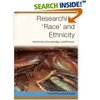Text submitted by Laura Cockburn
Part 1
I wasn’t sure what to expect from this book as it sounded as if it might be a difficult read from the subject matter.
In the introduction, the author begins by positioning her self in the subject as having a Sri Lankan, Indonesian, Scottish, Tamil mixed ethnicity, with an interest in the relationship between social and individual history. She describes her relationship with race, culture and ethnicity and her early experience with the concept of racism. This felt reassuring as the author’s personality was very much evident in her writing, and was not lost in theory.
The introduction sets the structure of the book clearly: methodology, production of knowledge, politics of doing research on race and ethnicity, interrelations with social differences eg gender, class, disability and dilemmas.
The author’s style of writing makes this book accessible and a very valuable read. The combination of her interest and enthusiasm for the subject and her logical style of presentation means that the ideas are easily understood and leads the reader to progress in their thinking about race and ethnicity in research.
Some of the central themes addressed are: looking at how we produce knowledge about difference; how what we know is caught up with histories and relations of power; and how to develop a critical theoretically informed approach to qualitative research methods.
Research on race and ethnicity is contextualised, putting it into historical context. Race is defined as a biological difference, and ethnicity as cultural difference and kinship.
I found the Post colonial context and how this defines the meaning of “p.c.” very interesting as the idea of contextualising my ideas of race and ethnicity is not something I had considered before reading this book.
The complexities of the treacherous bind -working with and against racial categories is another aspect which stimulated further thoughts. How to challenge the existing categories of race and ethnicity and yet these categories are needed to provide the structure/information for research. In my limited experience of research, doubled research- the idea of questioning and reviewing the very structure within which the research ideas may be created sounds extremely challenging and yet necessary.
In addition to this, the author also looks at how to work with inadequate race and ethnicity categories whilst not getting stuck in reinforcing and reproducing racial thinking. She challenges researchers to look at the relationship between the theoretical recognition of race and ethnicity as social categories and the lived experience.
It does mean there is a great responsibility for new researchers to challenge established patterns whilst also trying to carry out research within the traditional structures. If this is carried out for coursework as part of training or within an organisation, it will pose another level of complexity and challenge for the researcher.
Overall the first part of the book sets the scene by setting the context of challenging all current ideas about race and ethnicity in research, and recognising that it a difficult role to take on but necessary if research is to reflect the political and social changes in ideas, definitions and categorisation of race and ethnicity.
In part 2 Gunaratnum presents many thought provoking ideas around the theme of epistemological, ethical and methodological issues in research into race and culture or ‘interracial’ research as she phrases this. Her insistence that race and ethnicity are a significant part of all research, and not just the specialist concerns of those whose work is focused upon race provokes some rethinking of current methodological debates. How can we work ethically across difference and how does identity affect both the researcher and research participants and research?
Gunaratnum highlights the point that institutionally there are an increasing number of academics coming from ethnic minority groups but that the numbers are still relatively small. This group of academics undoubtedly are often employed in working on research linked to research and culture which in turn impacts research, careers and opportunities. I valued one of her conclusions which was that seeking to recognise how ‘race’ ethnicity and social differences are produced and have effects in qualitative interviews is undoubtedly difficult and ‘messy’ work but that this needs to be acknowledged alongside valuing the complexity and richness that comes with the mess.
In part 3 of this book Gunaratnam talks about the researching the ‘lived experience’ of ‘race’. She describes her research in which she has interviewed minoritized hospice users, and her struggle to analyse interviews in which participants have not referenced their race and ethnicity, which has left her feeling distanced. I loved her use of Althuser’s notion of ‘calling’ through non-neutral questions her interviewees to particular racialised identifications, for example through talking of their experiences of racism. I found helpful too the use of Knowles’ idea of ‘disassembling’ ‘race’ into the smaller concepts that give it meaning, and Higginbotham’s idea of theorising race as a mythical, overdetermining ‘metalanguage’, that can function to obscure the meanings of other social differences. She describes how these concepts have been helpful to her in analysing her interviews with Patricia, a Caribbean nurse who has had her larynx removed and who talks about race only as linked to her positive approaches to life, linked to her family background and Christian beliefs. She points out how in such descriptions race was being referred to but only indirectly, and that this Patricia's particular way of talking about her identity.
In another chapter she writes about ‘insecurities of meaning’ – moments when the meaning of particular words, phrases or gestures are particularly unclear and wide open to different interpretations. She argues against the idea that anthropology should be about establishing a shared meaning in that this will lead to the obscuring of difference, and that it will lead to the researcher ‘speaking as’ rather than ‘speaking with’ the research participant. Paying careful attention to and interpreting such ‘juddering’ moments can be a rich source of understanding about difference. This reminded me very much of my experience of working with interpreters and the usefulness of pausing when a particular word or concept is difficult to translate, bringing forth rich and interesting information about underlying differences of viewpoints, but it is also true of interactions in therapy without the medium of an interpreter: there are juddering moments in therapy when somehow we are using the same word as our clients but with very different meanings.
In her final chapter she argues for a ‘multisided’ research, which is reflexively aware of how the research relationship is situated within a broader social context, using the notion of ‘complicity’ to refer to how she sees both researcher and research participant being ‘curious and anxious’ about how their local narratives might be related to ‘great and little events happening elsewhere’. Her exemplar of such practice is a study by Lather and Smithies of the experience of 25 women living with AIDS, where pages are split in half with the womens’ accounts of their lives at the top and the researchers’ narratives (in which they connect with these accounts) at the bottom. This seems to me a model also for a postmodern therapeutic relationship, and for the kind of accounts of such practice that we should be writing. Indeed throughout the book I found myself translating Gunaratnam’s arguments into the world of therapy across difference and felt that they provided some extremely rich potential avenues of exploration and development for us in our field.
 Monday, 28th April and Tuesday, 29th April 2008
Monday, 28th April and Tuesday, 29th April 2008 psychoterapy, mediation and conflict resolution.
psychoterapy, mediation and conflict resolution. 



